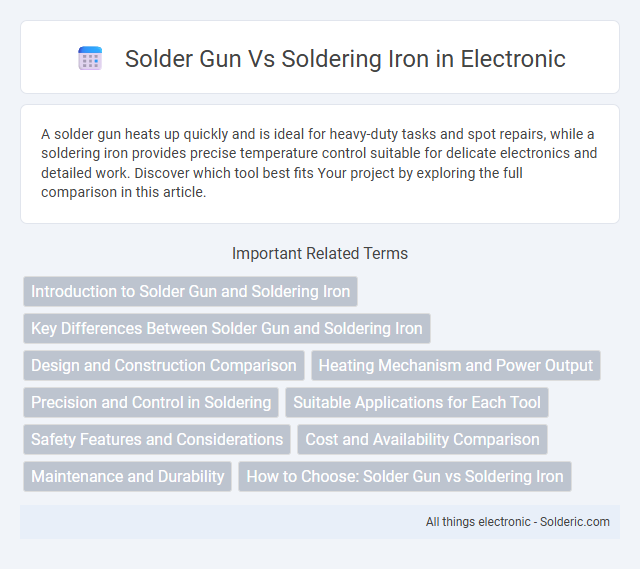A solder gun heats up quickly and is ideal for heavy-duty tasks and spot repairs, while a soldering iron provides precise temperature control suitable for delicate electronics and detailed work. Discover which tool best fits Your project by exploring the full comparison in this article.
Comparison Table
| Feature | Solder Gun | Soldering Iron |
|---|---|---|
| Heating Method | Transformer-based rapid heating | Resistive heating element |
| Typical Use | Heavy-duty, quick jobs, thicker wires | Precision electronics, circuit boards, detailed work |
| Temperature Control | Limited or none | Adjustable temperature settings common |
| Heat-Up Time | Instant heat (seconds) | Slower heat-up (tens of seconds) |
| Tip Size | Large, bulky tips | Small, fine tips |
| Power Consumption | High (typically 100-240W) | Low to moderate (15-60W) |
| Portability | Bulkier, heavier | Compact, lightweight |
| Cost | Generally inexpensive | Varies, often higher for quality models |
| Best For | Quick repairs, thick cables, auto electrical work | Electronics assembly, PCB soldering, fine work |
Introduction to Solder Gun and Soldering Iron
A solder gun is a handheld tool that uses a trigger to rapidly heat a copper tip, ideal for quick, heavy-duty soldering tasks such as wiring and metalwork, while a soldering iron provides steady, precise heat suited for delicate electronics and circuit board repairs. Solder guns typically reach higher temperatures faster but are bulkier and less accurate compared to soldering irons, which maintain consistent warmth for fine, controlled applications. Choosing between a solder gun and a soldering iron depends on the specific requirements of the project, including the type of materials, precision needed, and duration of soldering.
Key Differences Between Solder Gun and Soldering Iron
A solder gun features a pistol shape with rapid heating capabilities, ideal for heavy-duty tasks and quick repairs, while a soldering iron has a pen-like design suited for precise, delicate electronic work. Solder guns typically reach higher temperatures faster but consume more power, whereas soldering irons offer better temperature control and are more energy-efficient. The choice depends on the soldering project's complexity and component sensitivity, with soldering irons preferred for circuit boards and solder guns for thicker wires or metal sheets.
Design and Construction Comparison
Solder guns feature a pistol-shaped design with a trigger-activated heating element, allowing rapid heating and cooling, ideal for quick, heavy-duty soldering tasks. In contrast, soldering irons have a pen-like design with a continuously heated tip, providing precision and stability for detailed, delicate work. Your choice depends on whether you prioritize speed and power or control and accuracy in your soldering projects.
Heating Mechanism and Power Output
A solder gun utilizes a trigger-activated heating mechanism, rapidly heating a copper tip powered by a transformer, often delivering power outputs ranging from 100 to 240 watts for quick, high-heat applications. In contrast, a soldering iron maintains a constant temperature through an internal heating element, with power outputs typically between 15 and 60 watts, providing steady, controlled heat ideal for precision soldering. The solder gun's high power output allows for faster heating times but less temperature control, whereas the soldering iron excels in delicate tasks requiring consistent heat.
Precision and Control in Soldering
Soldering irons offer superior precision and control for delicate electronic tasks due to their fine tips and adjustable temperature settings, allowing for accurate heat application on small components. Solder guns, typically larger and less precise, generate rapid heat but lack the finesse needed for intricate solder joints, making them better suited for heavy-duty or larger-scale connections. Choosing between a solder iron and a solder gun depends on the level of detail required, with soldering irons preferred for precision electronics work.
Suitable Applications for Each Tool
Solder guns are ideal for heavy-duty tasks like automotive wiring, metalwork, and large electrical connections due to their higher wattage and rapid heating capabilities. Soldering irons excel in precision electronics, circuit board repairs, and delicate solder joints where controlled, lower heat is essential. Choosing the right tool depends on the material thickness and required heat intensity, ensuring efficient and damage-free soldering.
Safety Features and Considerations
Soldering irons typically offer adjustable temperature controls and insulated grips to reduce the risk of burns and overheating, enhancing user safety during precise electronic work. Solder guns often reach higher temperatures faster but lack fine temperature control, increasing the potential for accidental burns or component damage. Proper safety measures include using heat-resistant gloves, working in well-ventilated areas, and ensuring soldering equipment has built-in safety features like thermal cutoffs and stable stands.
Cost and Availability Comparison
Solder irons are generally more affordable and widely available in various wattages and designs, making them accessible for both beginners and professionals. Solder guns tend to be more expensive and less common, often found in specialty stores or online, limiting quick purchase options. The cost difference reflects their typical use cases, with solder irons favored for precision and solder guns preferred for heavier-duty tasks.
Maintenance and Durability
Solder guns require more frequent maintenance due to their heavier construction and internal trigger mechanism, which can wear out over time. Soldering irons typically have longer durability with simpler designs and replaceable tips, making upkeep straightforward and cost-effective. Your choice impacts ease of maintenance and tool lifespan, with soldering irons generally offering better durability for routine electronics work.
How to Choose: Solder Gun vs Soldering Iron
Choosing between a solder gun and a soldering iron depends on the project's precision and power requirements; solder guns deliver higher wattage ideal for heavy-duty tasks like automotive wiring, while soldering irons offer finer tip control suited for delicate electronics and circuit boards. Consider the soldering temperature range, tip interchangeability, and ergonomic design to match the tool with your specific application needs. For occasional repairs or hobby projects, a soldering iron's steady heat and compact size provide better accuracy and ease of use compared to the bulkier solder gun.
Solder gun vs soldering iron Infographic

 solderic.com
solderic.com